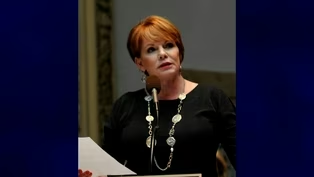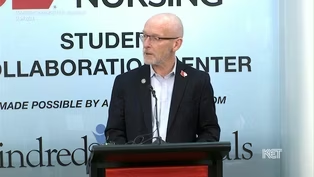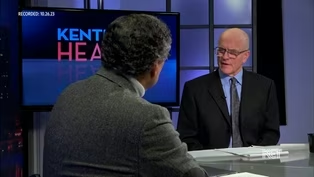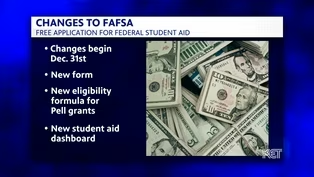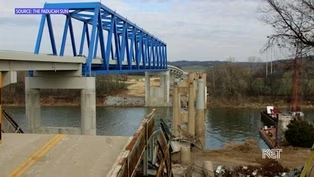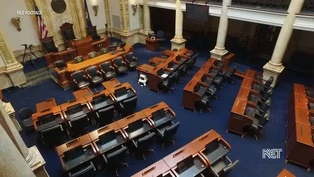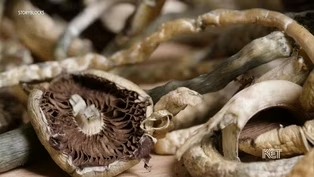
Saving Mollusks in Kentucky
Clip: Season 2 Episode 134 | 4m 36sVideo has Closed Captions
While several species of mussels are on the verge of extinction, the Kentucky ...
While several species of mussels are on the verge of extinction, the Kentucky Department of Fish and Wildlife's Center for Mollusk Conservation is working to keep that from happening.
Problems playing video? | Closed Captioning Feedback
Problems playing video? | Closed Captioning Feedback
Kentucky Edition is a local public television program presented by KET

Saving Mollusks in Kentucky
Clip: Season 2 Episode 134 | 4m 36sVideo has Closed Captions
While several species of mussels are on the verge of extinction, the Kentucky Department of Fish and Wildlife's Center for Mollusk Conservation is working to keep that from happening.
Problems playing video? | Closed Captioning Feedback
How to Watch Kentucky Edition
Kentucky Edition is available to stream on pbs.org and the free PBS App, available on iPhone, Apple TV, Android TV, Android smartphones, Amazon Fire TV, Amazon Fire Tablet, Roku, Samsung Smart TV, and Vizio.
Providing Support for PBS.org
Learn Moreabout PBS online sponsorshipWhile there are simple in appearance, there's more than meets the eye to the muscles and other mollusks that live in Kentucky's waterways.
The creatures play a vital role in the health of their ecosystems, while several species of mussels are on the verge of extinction.
The Kentucky Department of Fish and Wildlife Center for Mollusk Conservation is working to keep that from happening.
One of the interesting things about the muscles in Kentucky is we have over 100 species.
That's about a third of what we have in North America.
And about 100 out of 800 or so, you know, nationally in the world.
At any one time, you can go to a site anywhere in Kentucky, in the bigger rivers, like the green or the licking, and you can pick up like 30 species of mussels at one location.
We unfortunately have 29 species out of the 100 species or so in Kentucky that are listed as threatened, endangered by the U.S.
Fish and Wildlife Service.
Two of the three of those are threatened and 26 are endangered.
So that means we have 26 species that are close to extinction.
When they're eating their filtering the water, imagine an area the size of a football field and that's the width of the river.
And you have this water flowing across this football field.
Imagine there's 100,000 little tiny filters that are pumping all that water and then taking anything that's in the water like mud bacteria or any kind of suspended particle, even pollution, and concentrating that and dumping it on the bottom, sometimes binding it up so it doesn't get resuspended.
And now that result of that, you have this huge ecosystem benefit.
I think they're very under-represented group and I've just enjoyed learning about them and trying to do research and bring them back to the state.
They're a species that's been around and we want to make sure the same number of species are always, you know, we don't want to lose any species and if we can help them in any way and then just specifically towards mussels would be that how important they are to show good water quality, which is in turn good for our health and even just our drinking water.
Just so it's good to make sure they're around for that reason.
There's several that we've worked with that I think probably would be close to being extinct now if we didn't hadn't stepped in.
One is, is the endangered purple cat ball.
That species was thought to be extinct in the 1990s.
And then a researcher from Ohio just happened to run across one in a little stream in northeastern Ohio.
After five years of searching for these animals in the wild.
We finally found three or four individuals that were females.
We brought them here to offer civility in 2012 and started working with them up to 2023.
We have raised now over 10,000 animals and we've released them.
So now we have 12 locations around the country where there are at least 50 to 1000 individuals.
All of the endangered purple cats, Paul.
They just look like a rock.
So they just seem not very advanced, but just seeing all the different lowers, the different ways they interact with the ecosystem, with the fish and how the fish are important.
So I just called me just how different they all are when we distinct are just little rocks in the bottom of the river.
We raise our own freshwater algae.
There's not many places, maybe a couple other places in the country that do that.
And reason we do that is because we are working with more species than most people.
As a result of that, we need a good variety diet.
As a result of raising our own food, we can raise a few species, maybe the other other places that have trouble with because they don't do that.
It's nothing for us to raise 15 or 20 different species with eight or ten of those being endangered species each year.
Mussels that are rare and endangered, living only in the best water we have.
And so if there are places where we don't have endangered or rare mussels, that should send up a red flag to the people that live in that community, Why aren't there rare mussels here?
If they're here, that's a good thing.
That means that they're still hanging on.
Our water quality has been good enough to support them, but if they're not here, we need to do something about it.
Along with our work with mussels, the Center for Mollusk Conservation is also working to repopulate the endangered eastern hellbender salamander.
Another Longtime KY Lawmaker Leaving Frankfort
Video has Closed Captions
Clip: S2 Ep134 | 25s | State Senator Denise Harper Angel says she will not run for reelection next year. (25s)
A Boost for Louisville’s School of Nursing
Video has Closed Captions
Clip: S2 Ep134 | 1m 35s | The University of Louisville's School of Nursing has received a boost in its efforts to... (1m 35s)
Video has Closed Captions
Clip: S2 Ep134 | 2m 52s | One in eight American women is at risk of developing breast cancer, according to the ... (2m 52s)
Changes Coming to the FAFSA Program
Video has Closed Captions
Clip: S2 Ep134 | 31s | FAFSA stands for “Free Application for Federal Student Aid.” The program lets future ... (31s)
Video has Closed Captions
Clip: S2 Ep134 | 2m 27s | The dangers of "low head" dams and how a Kentucky community is honoring former First ... (2m 27s)
Lawmakers React to “Fast-Tracking” Report
Video has Closed Captions
Clip: S2 Ep134 | 8m 32s | Lawmakers are reacting to a new report from the progressive-leaning League of Women ... (8m 32s)
Video has Closed Captions
Clip: S2 Ep134 | 3m 37s | Supporters say Ibogaine can curb opioid addiction withdrawals and create a path to ... (3m 37s)
Providing Support for PBS.org
Learn Moreabout PBS online sponsorship
- News and Public Affairs

Top journalists deliver compelling original analysis of the hour's headlines.

- News and Public Affairs

FRONTLINE is investigative journalism that questions, explains and changes our world.












Support for PBS provided by:
Kentucky Edition is a local public television program presented by KET
